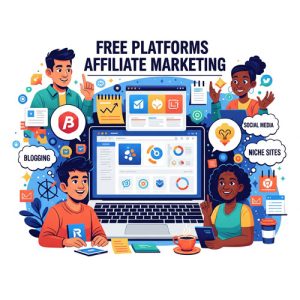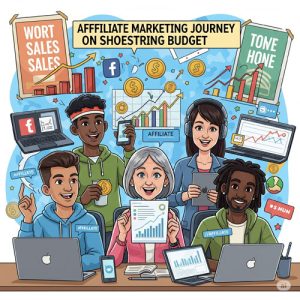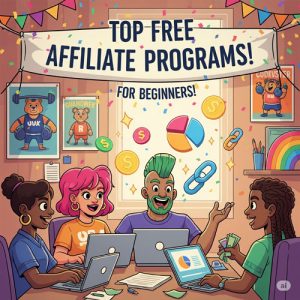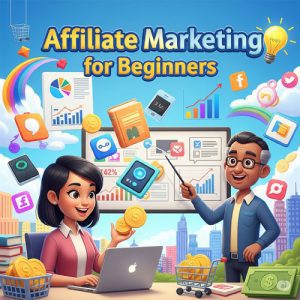 Getting started with affiliate marketing doesn’t require a website or budget — all you need are free platforms and smart strategies.
Getting started with affiliate marketing doesn’t require a website or budget — all you need are free platforms and smart strategies.
Whether you’re a complete beginner or just looking to scale without spending, this guide outlines the best free platforms to start affiliate marketing in 2025 and how to use each one effectively.
Why Free Platforms Are Ideal for Beginners
Starting with free platforms to start affiliate marketing allows you to:
Validate your niche and offers without financial risk
Start building an audience immediately
Learn content creation and promotion hands-on
Scale later with minimal overhead
Let’s explore the top free platforms to start affiliate marketing business.
1. YouTube
Why It Works: YouTube is the second largest search engine in the world and offers massive organic reach. People come to YouTube with questions, looking for tutorials, product reviews, and comparisons — all perfect content types for affiliate links.
How to Use It for Free:
Create an account and start uploading using just your phone
Focus on value-first videos like “How to Use [Tool] for Free” or “Best [Niche] Products for Beginners”
Add affiliate links in video descriptions (with a disclosure)
Optimize titles, thumbnails, and tags for search traffic
Tips: Use free tools like Canva to create thumbnails and YouTube Studio to analyze your video performance.
2. Medium
Why It Works: Medium is a free publishing platform with built-in readers and decent Google visibility. It’s ideal for long-form written content such as product comparisons, how-to guides, or affiliate resource roundups.
How to Use It for Free:
Create a free Medium account
Publish SEO-optimized articles with natural affiliate links
Join Medium Partner Program (optional) to earn via reads
Repurpose YouTube scripts or blog content for Medium
Tips: Add disclaimers and avoid sounding salesy. Focus on solving real problems.
3. Pinterest
Why It Works: Pinterest is a visual search engine with a high percentage of users looking for inspiration and products. It’s excellent for affiliate marketing niches like DIY, health, productivity, and online tools.
How to Use It for Free:
Create a business Pinterest account
Use Canva to design eye-catching pins
Link pins directly to affiliate products or blog posts
Optimize with keywords in your pin titles and descriptions
Tips: Pin consistently and join niche group boards to increase reach.
4. TikTok
Why It Works: TikTok offers massive reach potential, especially for short, engaging videos. Many affiliate marketers have gone viral with product demos, hacks, or lifestyle content.
How to Use It for Free:
Create fun, informative videos in your niche
Place a link in your bio (use Linktree to include multiple)
Build a following and promote products through storytelling
Tips: Stay authentic, use trending sounds, and keep videos under 30 seconds for better engagement.
5. Quora
Why It Works: Quora is a question-and-answer site that ranks highly in Google search. By answering niche-related questions, you can demonstrate expertise and gently drive traffic to affiliate offers.
How to Use It for Free:
Create a profile with your niche focus
Answer relevant questions and include helpful resources
Link to blog articles, YouTube videos, or free lead magnets that contain your affiliate links
Tips: Avoid spamming. Focus on building authority and trust.
6. Reddit
Why It Works: Reddit is home to thousands of active communities (subreddits) around every topic imaginable. If approached properly, Reddit can be a traffic goldmine for affiliate marketers.
How to Use It for Free:
Participate genuinely in niche subreddits
Share helpful tips or resources (not direct affiliate links)
Use value-packed comments and link to helpful articles you’ve written that contain affiliate offers
Tips: Read the rules of each subreddit and avoid self-promotion until you’ve built trust.
7. Facebook Groups & Pages
Why It Works: Facebook still has huge reach, especially in niche communities. You can use your profile, groups, or pages to build an audience and share recommendations.
How to Use It for Free:
Join or create niche-specific groups
Share tutorials, case studies, or mini-guides that include affiliate links
Host live Q&As or post value-driven content to build rapport
Tips: Focus on building relationships, not just selling. Engage in group discussions and answer questions.
8. Email (With Free Tools)
Why It Works: Email is one of the highest-converting channels for affiliate marketing. With free email platforms like MailerLite or ConvertKit (up to 500 subscribers), you can begin building a list right away.
How to Use It for Free:
Offer a free resource (guide, checklist, cheat sheet) to capture emails
Use free landing page builders (Carrd, Systeme.io, ConvertKit)
Send weekly value emails with soft affiliate promotions
Tips: Always provide value. Use storytelling, tips, or curated resources to maintain engagement.
Final Tips for Using Free Platforms Effectively
Focus on One Platform First: Master one before spreading thin across several
Repurpose Content: Turn a blog post into a YouTube script, Pinterest graphic, or TikTok
Stay Consistent: Publish on a schedule, even with limited time
Track Performance: Use Bitly, Google Analytics, or YouTube Studio to monitor what’s working
Final Thoughts On Free Platforms To Start Affiliate Marketing
The myth that you need a blog or budget to start affiliate marketing is just that — a myth. With the right mindset and tools, you can use free platforms to start affiliate marketing journey entirely for free using powerful platforms that already have traffic.
Start by picking the platform that aligns best with your skills (writing, video, visuals), then commit to 90 days of consistent, value-focused content creation.
Affiliate success doesn’t require money — it requires strategy, time, and consistency.



